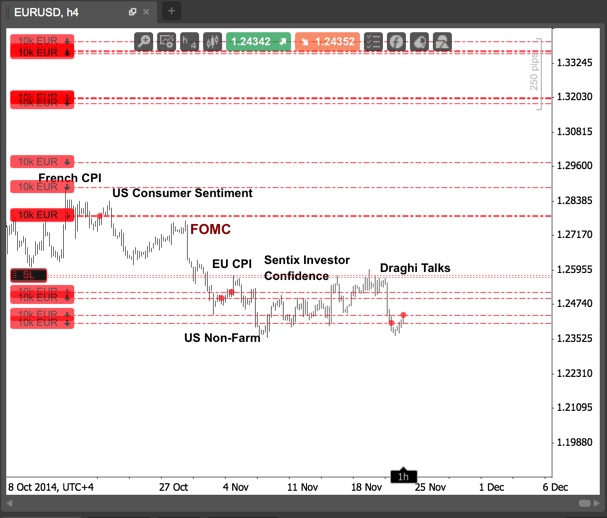Radicals are striving for power. Fundamental analysis for 24.11.2014
24.11.2014
At the very beginning of the European debt crisis was followed by a series of changing national governments. On the wave of popular discontent under populist slogans the radical parties began to gain support, which led to a lengthy parliamentary crisis. Now, however, the absence of any economic recovery plays into the hands of the newly formed opposition, which may in the coming years turn the political map of Europe.
The most telling, perhaps, is the example of France. In the midst of the crisis, Nicolas Sarkozy could not stay on as president, and socialists came to power. The campaigns were giving loud promises, the politicians promised to put an end to runaway spending cuts and return the economy to growth. Subsequently the socialists are bronzed and are not daring to contradict Brussels, who require the reduction of the budget deficit.
Reduction in unemployment could also not be achieved, and while inside the Socialist Party there were lengthy discussions, the popularity of the National Front gradually increased, which led the party to victory in the elections to the European Parliament. Moreover, surveys show that if the presidential election was held now, the leader of the national front Marine Le Pen could get more than 50% of the vote, defeating the incumbent French leader Francois Hollande in the first round.
Since the measures of the renewed government of the Fifth Republic in support of business and lowering taxes are unlikely to lead to any radical changes in the economy, the popularity of the national front can grow even more. A similar process is now taking place in Italy (Five Star Movement), Greece (Syriza Radical Party) and Spain (a recently formed party Podemos).
It is worth noting that in Greece the next general election will be held next year. Against the background of the continuing economic depression and intra-crisis, the Greeks may well come to mind populist promises to make life better. The difficulties of negotiations with the "troika" of creditors also aggravate the situation, which puts into question the allocation of the final tranche of € 7 billion, and it only helps the radical opposition.

On Monday, the weak growth of the business climate index in Germany, pushed the Eurodollar into a correction. Meanwhile, on Tuesday preliminary data on US GDP is expected. If statistics will not present any surprises and the figure will come out at 3.3% or higher, then the downward trend of the currency pair could gain momentum for its continuation.
RoboForex Analytical Department
The most telling, perhaps, is the example of France. In the midst of the crisis, Nicolas Sarkozy could not stay on as president, and socialists came to power. The campaigns were giving loud promises, the politicians promised to put an end to runaway spending cuts and return the economy to growth. Subsequently the socialists are bronzed and are not daring to contradict Brussels, who require the reduction of the budget deficit.
Reduction in unemployment could also not be achieved, and while inside the Socialist Party there were lengthy discussions, the popularity of the National Front gradually increased, which led the party to victory in the elections to the European Parliament. Moreover, surveys show that if the presidential election was held now, the leader of the national front Marine Le Pen could get more than 50% of the vote, defeating the incumbent French leader Francois Hollande in the first round.
Since the measures of the renewed government of the Fifth Republic in support of business and lowering taxes are unlikely to lead to any radical changes in the economy, the popularity of the national front can grow even more. A similar process is now taking place in Italy (Five Star Movement), Greece (Syriza Radical Party) and Spain (a recently formed party Podemos).
It is worth noting that in Greece the next general election will be held next year. Against the background of the continuing economic depression and intra-crisis, the Greeks may well come to mind populist promises to make life better. The difficulties of negotiations with the "troika" of creditors also aggravate the situation, which puts into question the allocation of the final tranche of € 7 billion, and it only helps the radical opposition.

On Monday, the weak growth of the business climate index in Germany, pushed the Eurodollar into a correction. Meanwhile, on Tuesday preliminary data on US GDP is expected. If statistics will not present any surprises and the figure will come out at 3.3% or higher, then the downward trend of the currency pair could gain momentum for its continuation.
RoboForex Analytical Department
Attention!
Forecasts presented in this section only reflect the author’s private opinion and should not be considered as guidance for trading. RoboForex bears no responsibility for trading results based on trading recommendations described in these analytical reviews.
